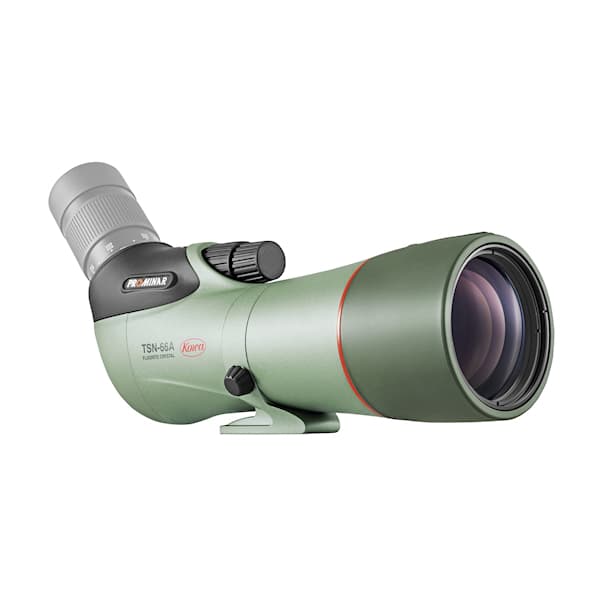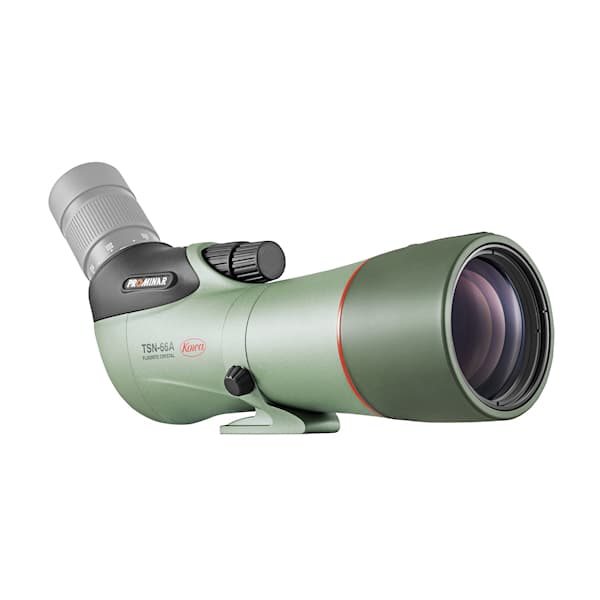Description
The Kowa TSN-66A PROMINAR 66mm Angled Spotting Scope is engineered for serious outdoor enthusiasts seeking superior optical performance in a compact form. Weighing only 1135g, this scope features a 66mm objective lens that delivers outstanding brightness and clarity, making it ideal for birdwatching, wildlife observation, and more. Built with advanced pure fluorite crystal optics, the TSN-66A ensures exceptional image quality in various lighting conditions, allowing you to fully appreciate the details of your surroundings.
Manufactured in Japan, the TSN-66A combines a robust 100% magnesium alloy body with a fully waterproof and nitrogen-filled construction, ensuring durability against the elements. Its dual focus mechanism allows for quick and precise focusing, enabling you to effortlessly adjust for optimal clarity. Additionally, this scope is compatible with Kowa's accessory collar and bayonet mount, providing versatility for various eyepieces and accessories. Enhance your outdoor experience with the Kowa TSN-66A, a reliable companion for nature lovers and photographers alike.
Features
- EXTENDED RANGE: The 66mm objective lens provides bright and clear images even at long distances, enhancing visibility during your outdoor adventures.
- LIGHTWEIGHT DESIGN: Weighing just 1135g, this spotting scope is perfect for travel, allowing you to carry high optical quality without added bulk.
- WATERPROOF CONSTRUCTION: Fully sealed and nitrogen-filled to withstand moisture and dust, assuring reliable performance in diverse weather conditions.
- PURE FLUORITE CRYSTAL: Achieve exceptional optical clarity and color rendition for true-to-life viewing experiences, enriching your observations.
- DUAL FOCUS SYSTEM: Quickly adjust and fine-tune your focus for precise targeting of subjects, making it easier to capture fleeting moments.
- ROBUST CONSTRUCTION: Designed with a durable 100% magnesium alloy body, this spotting scope combines strength and lightweight benefits for portability.
- CROSS COMPATIBILITY: Compatible with a variety of Kowa accessories, allowing for versatile applications tailored to your observational needs.
- COMPACT SIZE: Its ultra-compact design makes it ideal for outdoor activities, enabling ease of transport and storage.
Technical Specifications Table
| Specification | Details |
|---|---|
| Magnification | Not specified |
| Objective Lens Diameter | 66mm |
| Weight | 1135g |
| Length | 310mm |
| Material | Magnesium alloy |
| Minimum Focusing Distance | 3.5m |
| Filter Thread | 72mm |
What’s in the Box?
- Spotting Scope Body
- User Manual
- Carrying Case
- Lens Covers
Customer Reviews
“Lightweight and powerful, this spotting scope meets all my birdwatching needs!”
“The image clarity is truly unmatched. I take it everywhere.”
FAQ
How does the Kowa TSN-66A perform in low light conditions? The pure fluorite crystal lens enhances light transmission, making it highly effective in low light, ideal for dawn or dusk observations. You'll appreciate the clarity even in challenging environments.
Is the Kowa TSN-66A suitable for digiscoping? Yes, its compatibility with various Kowa accessories makes it an excellent choice for digiscoping, allowing photographers to capture stunning images with ease. This versatility enhances your ability to document experiences.
Similar Models
If you're interested in exploring more options, check out the Kowa TSN-660 or Kowa TSN-77 series for additional features and specifications tailored to your outdoor experiences. Discover the complete range of Kowa spotting scopes to find the perfect match for your needs.
Our Guarantees
FREE Fast Shipping Over $99
Enjoy complimentary expedited shipping on all orders over $99.
Secure Payments
Shop with confidence using our encrypted payment processing.
High Quality or Money Back
Not satisfied with your purchase? We'll refund your money, no questions asked.
Top-Notch Support
Our expert team is available to answer all your questions and provide assistance.
What Our Customers Say
Optics Knowledge Center
Understanding Rifle Scope Basics
Magnification
Magnification refers to how much larger an object appears through the scope compared to the naked eye. Fixed power scopes have one magnification setting, while variable power scopes offer a range (e.g., 3-9x).
Objective Lens
The objective lens is the front lens that gathers light. Larger objective lenses (measured in mm) gather more light, providing brighter images in low-light conditions but add weight and require higher mounting.
Reticle
The reticle (crosshair) is the aiming point inside the scope. Modern scopes offer various reticle designs, from simple duplex crosshairs to complex ballistic reticles with holdover points for different distances.
Adjustments
Rifle scopes have turrets for windage (horizontal) and elevation (vertical) adjustments. These are measured in MOA (minutes of angle) or MRAD (milliradians) and allow precise aiming adjustments.
Proper Scope Mounting Guide
Select the Right Rings & Base
Choose rings that match your scope's tube diameter (typically 1", 30mm, or 34mm). Select a base compatible with your rifle's receiver. For heavy-recoiling rifles, opt for stronger mounts.
Install the Base
Clean the receiver and base thoroughly. Apply a small amount of blue Loctite to the screws. Attach the base to the receiver and torque the screws to manufacturer specifications.
Attach the Rings
Attach the bottom halves of the rings to the base. Place the scope in the rings and loosely attach the top halves. Don't fully tighten yet.
Set Eye Relief & Level
Position the scope for proper eye relief (3-4 inches) in your normal shooting position. Ensure the reticle is level using a scope leveling tool. Once positioned correctly, tighten the rings evenly in a cross-pattern.
Scope Zeroing Tips
Start Close
Begin zeroing at a shorter distance (25-50 yards) to ensure you're on paper before moving to your desired zero distance (typically 100 yards).
Use a Stable Rest
Always zero your rifle from a stable shooting position using a bench rest, sandbags, or a shooting rest to eliminate as much human error as possible.
Fire Groups
Fire 3-shot groups before making adjustments. This provides a more accurate representation of where your rifle is shooting than single shots.
Make Deliberate Adjustments
Know your scope's adjustment values (typically 1/4 MOA per click). If your group is 2 inches low at 100 yards, you'll need to adjust up 8 clicks (for a 1/4 MOA scope).
Confirm Your Zero
After making adjustments, fire another group to confirm your zero. Repeat the process until your point of impact matches your point of aim.
Document Your Settings
Once zeroed, record your settings including distance, ammunition used, and environmental conditions for future reference.
Optics Maintenance & Care
Cleaning Lenses
- Start by blowing or brushing away loose particles
- Use a lens pen or microfiber cloth for fingerprints
- For stubborn dirt, use lens cleaning solution (never household cleaners)
- Clean with gentle circular motions from center outward
Protecting Your Optics
- Always use lens caps when not in use
- Store in a dry place with silica gel packets
- Avoid extreme temperature changes
- Use a quality scope cover in harsh conditions
Regular Maintenance
- Check and tighten mount screws periodically
- Inspect O-rings and seals for damage
- Verify zero after rough handling
- Clean the exterior with a damp cloth
What to Avoid
- Never use fingers to touch lenses
- Avoid paper products (tissues, paper towels) on lenses
- Don't use acetone, alcohol, or household cleaners
- Never disassemble your scope (voids warranty)










